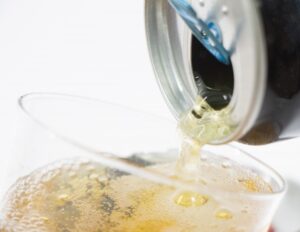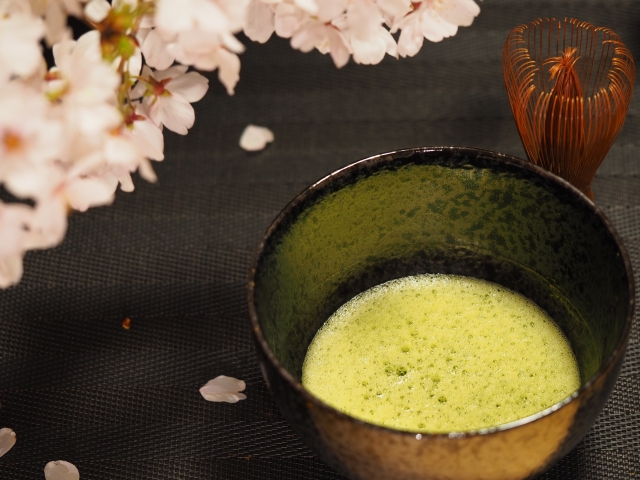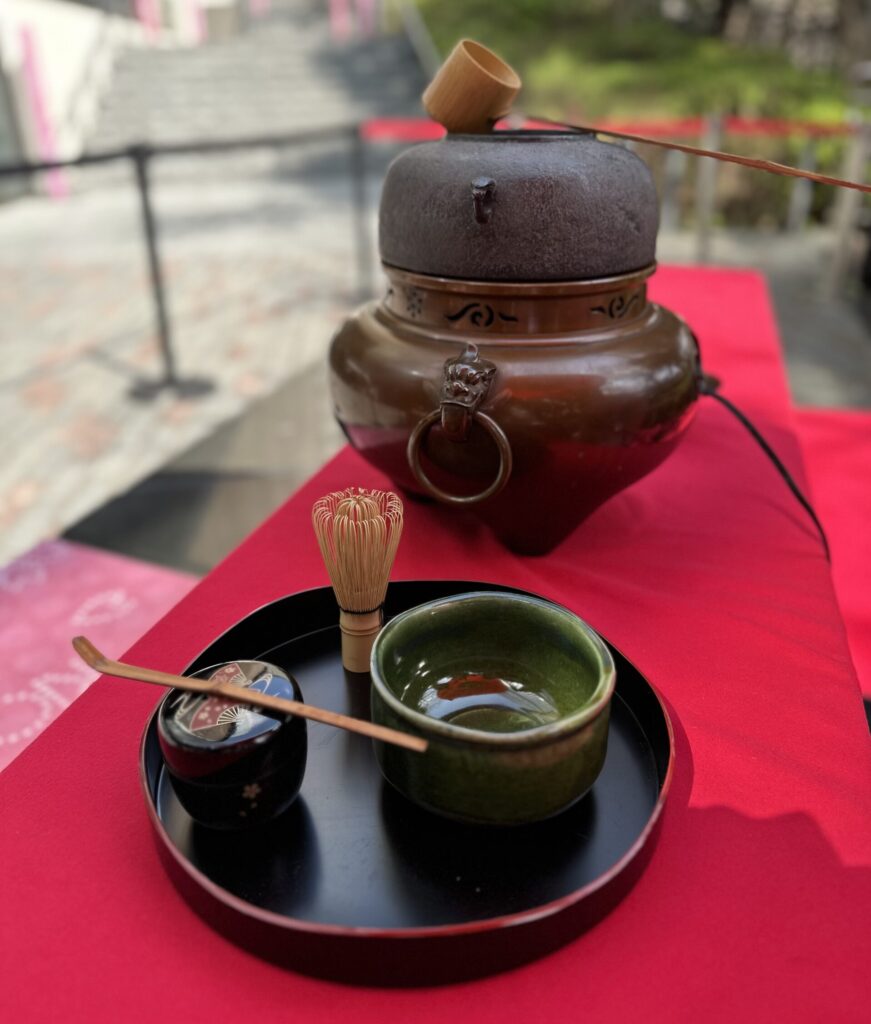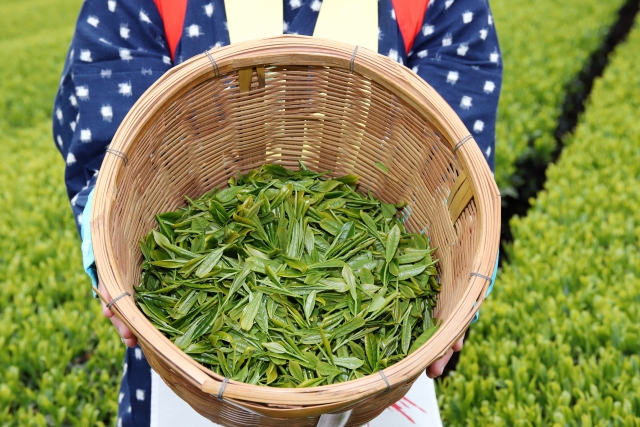Introduction
In recent years, caffeine-containing beverages have become an indispensable part of our lives. Energy drinks and matcha, in particular, have very different characteristics in terms of their effects and methods of consumption. Energy drinks are characterized by their immediate stimulant effects, while matcha tea provides a mild and lasting effect.
Comparing caffeine content, a typical energy drink (e.g., Monster Energy 355 ml) contains about 142 mg of caffeine, which is equivalent to about 2.2 cups of matcha tea. However, a simple comparison of caffeine amounts does not give a complete picture of the effects of these drinks on the body.
Of particular interest is the difference in how each drink affects metabolism. The high concentrations of caffeine and sugar in energy drinks can cause a rapid energy boost, but can also cause a variety of problems due to the subsequent steep drop in energy. In contrast, matcha tea provides a more natural form of energy, with a slower absorption of caffeine due to the presence of L-theanine.
This article will compare the characteristics of these two drinks in detail, with a particular focus on their metabolic effects. Proper consumption and precautions will also be discussed, providing guidelines for healthier use of each drink.
1.Peculiarity of Matcha: Highly effective in small quantities
What does it mean to consume whole tea leaves?
Let us explain in detail the characteristics of whole tea leaf ingestion:
1.Difference from regular green tea
- Regular green tea:
- Tea leaves are steeped in hot water to extract the constituents
- Only the water-soluble components are consumed
- Tea leaves are discarded
- Whole tea leaves:
- Tea leaves themselves are powdered and ingested
- All soluble and insoluble components can be ingested
- Dietary fiber can also be ingested
2.Differences in Nutritional Value Compared to regular green tea, the following nutrients are contained in much higher amounts
- Catechins: 2 to 3 times higher
- Vitamin E: 20 times higher
- Dietary fiber: 10 times higher
- Minerals: 5-10 times higher
- β-carotene: nearly 100% (not normally extracted)
3.Characteristics of absorption efficiency
- Benefits:
- All nutrients are available, including insoluble components
- Dietary fiber improves intestinal environment
- Slower absorption of catechins and lasting effects
- Cautions:
- Higher than usual intake of caffeine
- May interfere with iron absorption
- May be hard on the stomach for some individuals
While consuming whole tea leaves provides more nutrients than regular green tea, it is important to adjust the appropriate intake according to one’s constitution and physical condition.
The optimal way to drink matcha:
1. first thing in the morning: 2 g (about 64 mg caffeine)
2. in the afternoon at work: 1 g (approx. 32 mg caffeine)
3. after evening: 0.5g (approx. 16mg caffeine)
Dip the bottle in water at 70-80°C to prevent rapid release of caffeine.
Notes:
- More caffeine than usual also consumed
- May interfere with iron absorption
- May be hard on the stomach for some individuals
While whole tea leaves provide more nutrients than regular green tea, it is important to adjust the appropriate intake according to one’s constitution and physical condition.
2.Comparison of energy drinks and conventional beverages
Comparison of Caffeine Content
- Monster Energy (355ml): 142mg
- Equivalent to about 2.2 cups of green tea
- Equivalent to about 1.6 cups of coffee
Black tea and hojicha have less caffeine
Black tea and hojicha also contain caffeine, but less than coffee and matcha.
A cup of black tea (150 ml) contains about 45 mg of caffeine, while a cup of hojicha (150 ml) contains about 30 mg.
A single Monster Energy contains more caffeine than two cups of matcha tea.
Even those who do not usually drink energy drinks may have had Red Bull or Monster Energy at least once.
One Red Bull (250 ml) contains 80 mg of caffeine.
The amount of caffeine in one (355 ml) Monster Energy is estimated to be 142 mg, which is more than other drinks.
This is good for those who are going to work or study for a long time, as it has a longer awakening time and stronger effects.
However, excessive caffeine intake can cause insomnia, irregular heartbeat, and nausea.
Young people who are still growing and pregnant or nursing women are also highly affected by caffeine, so be careful not to consume too much.
Energy drinks contain high amounts of caffeine, so it is best to limit the amount of caffeine to 1~2 bottles per day.
Also, unlike coffee and matcha, which can be consumed unsweetened, energy drinks contain a lot of sugar, so it is best to watch your daily intake in terms of calories.

3.Cautions about energy drinks and matcha (especially metabolic effects)
1.Effects of sugar intake
Energy Drinks
The high sugar content in energy drinks (typically 25-35 g/can) causes rapid metabolic fluctuations in the body. As soon as this large amount of sugar enters the body, it triggers a massive secretion of insulin, causing a rapid rise in blood glucose levels. However, this rapid rise is inevitably accompanied by a sharp drop, causing a so-called “blood glucose spike.
This blood glucose spike not only causes an immediate feeling of hunger, but also raises the risk of metabolic disorders in the long term. Daily consumption in particular can have a negative impact on the body’s sugar metabolism function.
Matcha (powdered green tea)
Matcha, on the other hand, is sugar-free and contributes to maintaining stable blood sugar levels. It provides energy in a natural way without causing an overproduction of insulin. This helps curb unnecessary hunger pangs and supports healthy weight management.
2.Energy Metabolic Patterns
【Energy drink】
Short-term effects
Energy delivery from energy drinks is characterized by rapid rises and falls. A strong stimulant effect can be felt immediately after ingestion, but the effect can rapidly diminish within 1-2 hours, causing a severe “caffeine crash”.
About the Caffeine Crash
A caffeine crash is a series of unpleasant symptoms that occur several hours after the effects of caffeine wear off. The main symptoms include
- Sudden fatigue
- Loss of concentration
- Irritability and agitation
- Headaches
- Lethargy and weakness
- Sudden onset of drowsiness
In the case of energy drinks, this caffeine crash tends to be particularly noticeable. The reasons for this:
- Effects of high concentrations of caffeine
- Large amounts of caffeine ingested at one time can cause a major imbalance in the body’s metabolism
- Large repercussions from the rapid arousal effect
- Combined effects with sugar
- Blood sugar spikes due to high sugar content occur at the same time
- Added fatigue from sugar metabolism
- Rapid drop in blood glucose level due to rapid secretion of insulin
- Strain on the body
- May cause adrenal fatigue
- Disrupts the balance of the autonomic nervous system
- Negative effect on the body clock
Long-term effects
Continued intake risks causing insulin resistance, which may increase the risk of developing diabetes. In addition, rapid fluctuations in blood glucose levels may promote the accumulation of visceral fat and lead to a decrease in overall metabolic function.
【Matcha】
Short-term effects
The synergistic effect of caffeine and theanine in matcha tea is characterized by a slow and sustained energy supply. In addition, the action of catechins promotes fat burning and sustained concentration. It supports the maintenance of vitality in a natural way, rather than a rapid awakening effect.
Matcha has the unique feature of preventing caffeine crash:
- L-theanine acts
- Provides a relaxing effect
- Slows the rate of caffeine absorption
- Both concentration and calm alertness
- Slow metabolism
- Caffeine absorption is gradual
- Avoids rapid energy fluctuations
- Provides sustained alertness
- Advantages of sugar-free
- Avoids rapid fluctuations in blood glucose levels
- Provides a stable energy supply
- Reduced accumulation of fatigue
- Synergistic effect with catechins
- Metabolism-regulating action
- Supports sustained energy supply
- Reduces fatigue due to antioxidant effect
Long-term effects
Continuous consumption of matcha tea may improve basal metabolism and improve the efficiency of fat burning. May contribute to stabilization of blood glucose levels and improve overall metabolic function.
3. other points to note
Energy drinks
- Excessive caffeine intake may cause insomnia, heart palpitations, and other symptoms
- There is concern about the effects of artificial sweeteners and coloring on the body
- Nighttime consumption increases the likelihood of sleep disturbances
- Habitual consumption may lead to the formation of a dependence on caffeine
Matcha (powdered green tea)
- It is important to observe proper daily intake (generally 2-3 cups)
- Consumption on an empty stomach can be irritating to the gastric mucosa
- Tannins in tea may interfere with iron absorption
- Different body types may react differently to caffeine
Practical Advice
Key Points to Prevent Caffeine Crashes:
- Be creative in how you drink
- Avoid taking it first thing in the morning (2-3 hours after waking up is preferable)
- Avoid consumption on an empty stomach
- Drink plenty of water
- Appropriate dosage
- Energy drinks: 1 can per day
- Matcha (powdered green tea): 2-3 cups per day
- Timing
- Avoid consumption after 3:00 p.m.
- Consume with meals
- Avoid intake before and after exercise
Conclusion
Matcha is the preferred choice when considering metabolic health care. However, it is important to observe the appropriate amount and time of intake for both beverages, depending on the individual’s physical condition and daily rhythm. In particular, avoid nighttime consumption and try to consume them in the morning or early afternoon.
4.Caffeine Intake Guidelines for Pregnancy and Lactation
Recommended Values by International Organizations
- WHO (World Health Organization)
- Recommended upper limit: 300 mg/day
- Purpose: Reduce risk of miscarriage and low birth weight
- EFSA (European Food Safety Authority)
- Recommended dosage for pregnant women: 200 mg/day or less
- Lactating mothers: 200 mg/dose, 200 mg/day or less
What is the recommended amount of caffeine to consume during pregnancy and lactation?
Some overseas countries consider the effects of caffeine on health and indicate the recommended amount of caffeine intake for pregnant and lactating women.
Pregnant women should be careful not to consume too much caffeine.
World Health Organization)
cautions to limit caffeine intake to no more than 300 mg/day during pregnancy to reduce the risk of miscarriage and low birth weight of newborns.
European Food Safety Authority(EFSA)
Regarding habitual caffeine intake, pregnant women are advised that caffeine intake of 200 mg/day or less poses no health risk to the fetus, while lactating women are advised that caffeine intake of 200 mg/day or less per serving and habitual caffeine intake of 200 mg/day or less pose no health risk.
5.Ideal Caffeine Intake
Recommended Intake Pattern by Subject
General adult
Ideal daily intake pattern
Morning: Matcha green tea (64mg)
Lunch: coffee (90 mg)
Afternoon: Matcha (32mg)
Total: 186mg
For desk workers
Intake pattern for maintaining concentration
Before work: Matcha (64mg)
Lunch break: Coffee (90mg)
3 p.m.: Matcha (32 mg)
Total: 186mg
Practical TIP
Three tips to prevent a caffeine crash
1. start with matcha first thing in the morning
2. limit the amount to half in the afternoon
3. avoid after evening
6.Conclusion
- Matcha tea is an effective caffeine source in small amounts.
- Mild stimulant effect due to the presence of L-theanine
- Particular attention should be paid to the amount consumed during pregnancy
- Be aware of the combined effects of energy drinks with sugar
The report provides a comprehensive analysis of the properties and effective intake of caffeine-containing beverages, especially matcha and energy drinks.
The most important characteristic of matcha is that its nutritional value is significantly higher than that of regular green tea due to the consumption of whole tea leaves. It contains 2-3 times more catechins, 20 times more vitamin E, 10 times more dietary fiber, and has the added benefit of slowing the absorption of caffeine due to the presence of L-theanine.
Energy drinks, on the other hand, contain high concentrations of caffeine (142 mg in 355 ml of Monster Energy) and sugar (25-35 g/can), which can cause a rapid energy rise followed by a sharp drop (caffeine crash). This rapid blood sugar fluctuation may increase the risk of metabolic abnormalities in the long term.
With regard to pregnant and lactating women, WHO recommends a caffeine intake of no more than 300 mg per day, and EFSA more cautiously recommends no more than 200 mg. An ideal intake pattern for the general adult population is suggested to be a combination of matcha (64 mg) in the morning, coffee (90 mg) in the afternoon, and matcha (32 mg) in the afternoon, for a total limit of 186 mg.
In conclusion, matcha is the preferred choice in terms of healthy metabolic management, but in both cases it is important to observe the proper amount and time of intake. Matcha, in particular, is positioned as a healthier means of caffeine intake due to its ability to be consumed unsweetened and to provide sustained arousal.
References
- WHO Pregnancy Caffeine Guidelines (2023)
- EFSA Safety Assessment Report (2024)
- Japan Central Tea Industry Association Research Report (2023)







